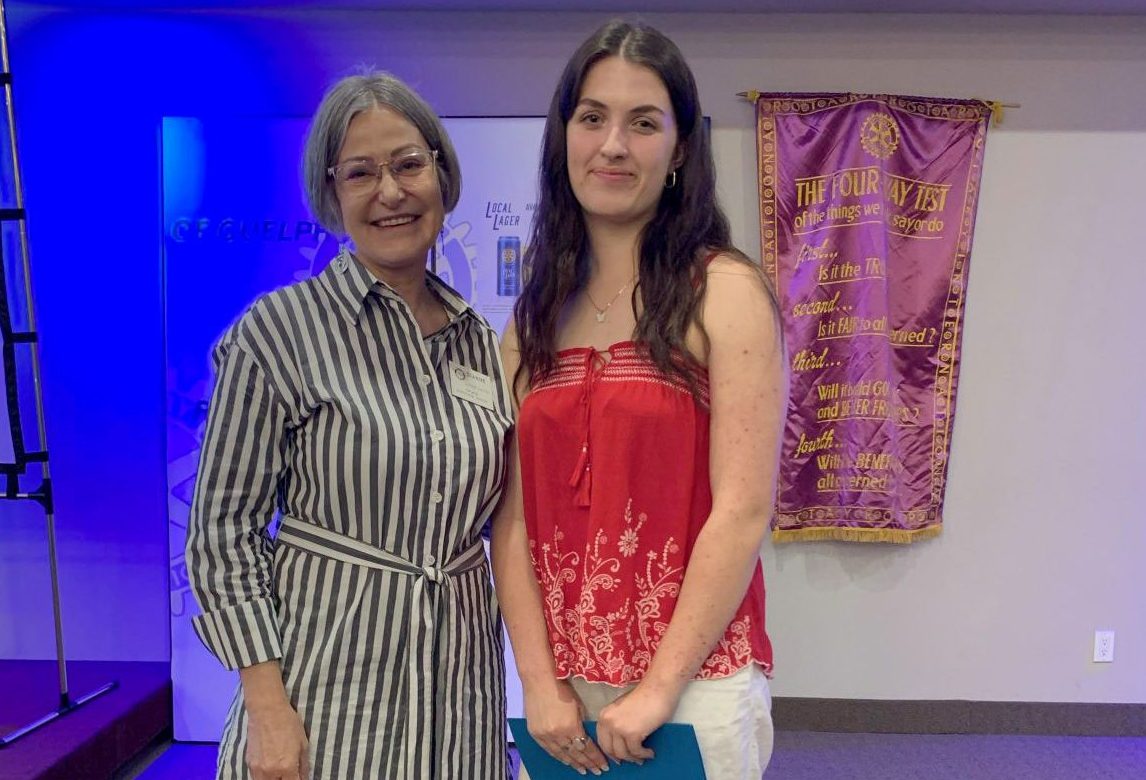FERGUS – Making change is no small feat, but taking small steps to get there is something everyone can do according to Avaline Booth, a Grade 10 student from Centre Wellington District High School (CWDHS) and recent recipient of the 2022 Rotary Indigenous Youth Award.
Each year, the Rotary Club of Guelph selects a student of Indigenous ancestry to receive the annual Indigenous Youth Award – also known as the Turtle Island Festival Award – for demonstrating leadership qualities in the community and in the promotion of Indigenous culture.
“Avaline’s commitment to learning and sharing Indigenous culture is apparent,” said Rotary Club member and chair of the Indigenous Awareness Committee Dianne Dance.
“Her confidence in being able to speak about issues that are important to her really stood out to me,” Dance added. “Avaline is still in high school yet has the commitment to social justice and equity well beyond her years.”
Booth is a citizen of the Métis Nation of Ontario whose ancestors were fur traders with the Northwest Fur Company
Her work includes organizing rallies and marches with peers at CWDHS, founding the Indigenous Student Alliance and creating the Youth 4 Justice group alongside fellow students, which held a rally in March.
In an interview with the Advertiser, Booth said it’s been really great to take a step back from the work she’s been doing and see how all the little steps she’s taken are paying off.
“I’ve always been super passionate about that kind of stuff,” she told the Advertiser. “I think my mom has a lot to do with that, because she’s a big advocate in our community as well.”
Booth is also a student member on the UGDSB’s First Nation, Métis and Inuit Education Council and was appointed as the youth representative for the Grand River Métis Council in May.
In July 2021, she had the opportunity to connect to her Indigenous roots and build a canoe from scratch through an exercise with the Upper Grand District School Board. Students who participated in the program then made presentations in their schools about their experiences.
“The presentations showed that there were people who were interested in those kinds of things,” Booth said.
It was after taking part in an equity march at CWDHS that Booth said she realized how much she enjoys advocating for and supporting her community.
“Then I just started joining a bunch of clubs and things that really brought out that this is something that I really enjoy doing,” she explained.
“I think because I know the difference, I’ve been able to see and recognize the difference, through talking with family members and friends and looking at the news and being Indigenous myself, there’s just so many things that I know can be done,” she added.
“And I think as a person who has the capability to make change, because I’m very lucky with the situation that I’m in and I was born into a situation where I have the possibility to make change, I think that’s what really keeps me going is for the people out there who can’t make change for themselves.”
The big picture
Booth said there are different motivations that inspire her to create change.
“For example, when I founded the Indigenous Student Alliance at [CWDHS], my motive was to create a safe space for Indigenous students at our school as well as Indigenous allies,” she explained.
“Overall, the big picture is to make sure everybody feels safe within our community, and that they always can have someone to turn to, because there’s a lot that needs to be done before change happens.”
Booth said while the big picture might seem far away, for her, it’s about making those small steps to get there that’s important.
Reflecting on her experiences so far, Booth hopes that her involvement will set an example for her friends and peers who see the work that she’s doing and the opportunities and resources it creates.
“I have a younger sister [and] she’s watching all the things that I’m doing, and she sees how easy it is to get involved,” Booth explained. “And then when you get involved you have to be able to show your own initiative to make that change.
“This feels really important to me,” she added. “Going back to when I built the canoe in the summer, I feel like that was kind of the kickstart for all of this. That’s when I was really able to connect with my culture.”
Booth noted learning doesn’t always have to begin in a classroom setting, and that taking a hands-on and listening approach is also important.
“I think in doing all of this and doing research and meeting other people and especially hearing different stories is very important,” she said.
“And it shows that there are so many different possibilities when it comes to learning.”




